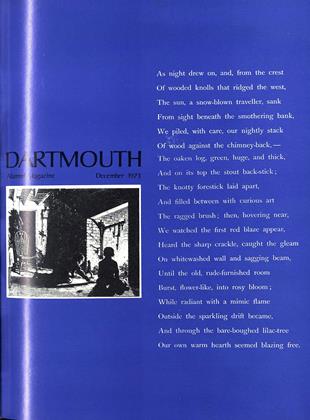This wandering bull moose caused abig stir in Hanover, Norwich, andWest Lebanon Saturday. The maturemoose was first spotted in Norwich,crossed the Ledyard bridge intoHanover and disappeared . . .heading for the West Lebanon line.- Valley News photo caption
Cars snap points of light against the sun. Patiently he waits between the scrub birch and pine. Soon all dies to a distant whirr. Huge bones slowly lean into each other and the moose scuffs and waltzes down the sandy cut, measures his large splayed hoofs along the sticky tar. The bridge is clear and on the other side floating in a muff of heat black needles knit a sleeve up the shoulder of Moose Mountain.
Crossing the bridge he looks over the rail and watches his long bearded muzzle sprout from the deep mud and float away again and again. It is the river god—the great forked horns supplicate like trees, tug at the sky like paws, twist and bleed away, returning with the returning ripple. His dribbling beard maps the valley spreading to the sea. Turning his head he ambles the last fifty yards, apparently not noticing the squealing Buick skid a little to its side, the camera-flash reflect in his unblinking eyes.
Over Moose Mountain the sky is polished blue, the red tower-light bleached by the sun. Stones lean together like the bones of mammoths. Something in a stifling hollow where last year's leaves are faded puce rises in a small whirlwind of dust and listens as it has listened for two-hundred years to farmers hunting their sheep, hikers from the college, picnickers, lovers - always behind a screen of trees. Something rises and draws in the dead air through a mossy mask. The cries of half-starved Indians fade down the slope, arrows sprout from its side and slip backwards through the trees. It inhales the long swamp of a cry and breathes it again, silent, across eight miles.
Its future, lounging on the New Hampshire side of the bridge, overlooking a reporter, ceases chewing his cud. All legs stiffen and he bolts into the woods past the Canoe Club, antlers wreaking antlers from the trees. Trailing leaves drunkenly, he breaks up Wheelock St. avoiding the small rocks of Volkswagens, is last seen puncturing the junk-festooned wilderness of Mink Brook winding among Model-T's through whose broken windshields nose the silver ghosts of trout, finally reels up the true stream after the cry of his ancestor waiting in a tiny storm of leaves.
The last sun soaks like blood into the hillside. Panting, legs strain upward, a moving tree bobbles, disappears among fixed saplings, clangs against the rust-streaked leg of the relay tower, quivers to a halt.
Then
the answering cry, hoarded in the genes for two-hundred years, nursed in the gray swamps, hurled in the scissoring teeth of wolves, against the red-checked shirts opening little lights at a distance, smashed against the yellow diesel's maddening steel horn: That cry unheard by the men of Hanover—that cry rooting in the cracks of rocks, knitting the trees over the bald shoulders of mountains, driving the trout like leaves, drawing the hills into the circle of its secret- winds into the valley with the sun's thickening blood, covers everything not listening like night.
"The Moose on Ledyard Bridge" by Robert Siegel - Granite Publications
 View Full Issue
View Full Issue
More From This Issue
-
 Feature
FeatureWHY COLLEGE ?
December 1973 -
 Feature
FeatureWatergate and the Press
December 1973 By H. WILLIAM SHURE -
 Feature
FeatureMiSSING IDOL:KOM AGAIN?
December 1973 By MICHAEL STUART '71 -
 Feature
FeaturePoet of Place
December 1973 By R.B.G. -
 Article
ArticleBig Green Teams
December 1973 By JACK DEGANGE -
 Article
ArticleMILLETT G. MORGAN
December 1973 By R.B.G.








